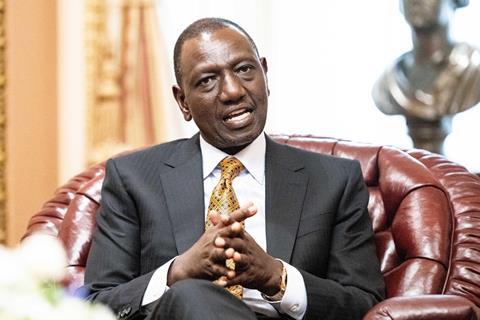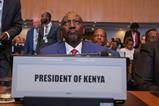Church leaders worry that a new bill designed to crack down on rogue clerics in Kenya could be used against mainstream churches. Daniel Sitole reports

It is two years since Kenyans elected a new government led by a self-professing Christian.
The majority of evangelical clergy supported William Ruto’s campaign, but many now feel cheated.
If the Religious Regulations Bill becomes law, churches and their clergy will be required to register with a newly formed Office of Registrar of Religious Organisations. Preachers will have to meet certain eligibility requirements, including academic and professional qualifications, in order to minister. And every church must belong to a recognised umbrella religious organisation.
The assistant bishop of the Anglican Church of Kenya (ACK), Rt Rev Dr Emily Onyango is among those opposing the plans. “The bill is suspicious as it might set the stage for the state control and gagging the Church to the extent that the clergy will not play their prophetic role,” she has warned.
Proponents say the bill has been designed to target “rogue” churches and cults. “Rogue pastors focus on amassing wealth, driving big cars and investing in real estate, while demeaning their followers as poor people, because of their little faith or failure to plant good seeds [give money]” said Rev John Njuguna of the United Christians Fellowship.
But some evangelical leaders fear the obligation to provide academic qualifications to the authorities will result in legitimate churches being outlawed. The bill states that any person who operates an unregistered Church could face a fine of up to 5 million Kenyan Shillings (£31,250), plus three years in prison.
The bill is being proposed in the wake of a number of high profile cases involving religious cults and radicalisation. The most well known is the Shakahola incident, where 400 people lost their lives after Pastor Paul Mackenzie alledgedly ordered his followers and their families to starve to death as a way of going to heaven. Pastor Mackenzie is considered the sole owner or de facto leader of Good News International Church. He and his 94 co-accused assistants are facing charges including terrorism, murder, manslaughter, child torture and cruelty. A post-mortem report says the majority of the victims died of starvation, strangulation, suffocation and assault.
The Shakahola deaths are not the only example of religious-based extremism in Kenya. Other notable examples include terror attacks on the US Embassy in 1998, Westgate Mall in 2013, Garissa University in 2015, and Dusit Hotel in 2019. Hundreds of people died and thousands others suffered life disabilities in such attacks, which were committed by Islamists.
Crackdown on freedom?
There are fears the new bill will criminalise Christian beliefs, such as claims of miracle healings, blessings and prosperity as “extortion”. According to the bill, any preacher who falsely claims to have powers of performing miracles or related matters shall commit an offence.
Additionally, the bill seeks to crack down on coercion. “A person shall not convert or attempt to recruit into their religion, convert any person from one religion to another by misrepresentation, force, undue influence or coercion. Recruit, convert or attempt to convert children from one religion to another without the consent of their parents or guardians. A person shall also not indoctrinate any person with a religious doctrine, use religion to exploit another person financially.”
Taxing churches
The bill seeks to control and tax income from all sources of religious organisations in the country. Taxable income will include cash and in-kind offerings, tides, donations, bequests, and earnings from investments. Churches will be required to declare their income from all sources in their annual returns to the government and any Church that fails to file a return will face finanical penalities.
Bishop Onyango has warned taxes on churches will prevent them from offering essential grassroots services, where, in most instances, the state fails to deliver, especially in healthcare, education, relief supplies to people in hardship. “Churches are supportive to the needy in society, such as the sick, widows and orphans. If the state imposes taxation, then the Church will not be able to offer the services.”
The so-called “prosperity gospel” has divided churches in Kenya. Those in favour of the bill warn that criminals have infiltrated the churches for extortion of innocent believers. They say that state vetting is necessary to clean up the mess. But Kenyan Christians across all major denominations are united in their opposition. They reject the bill, and argue the Church should be left to regulate itself.
Bishop Onyango believes the government should be focussed on fighting corruption in the public sector and collect more revenue from the rich, who evade paying taxes, instead of taxing the churches. “They should remember that the money Christians contribute to the churches is what remains after they have paid taxes. Taxing it again, it will lead to double taxation.”
Clergy from all the 47 counties of Kenya have rejected the bill, saying their mission does not require any favour from the state.
“Jesus himself directed us to go into the world and preach the Gospel to all creatures,” Pastor James Njoroge of the Christian Revival Ministries remarked. “We are and will continue preaching the Word of God in churches, streets, villages, schools, market places, in the country and beyond.”


































